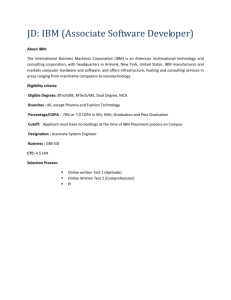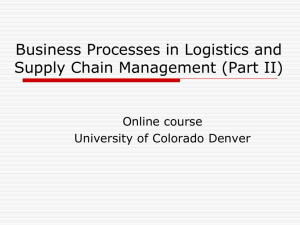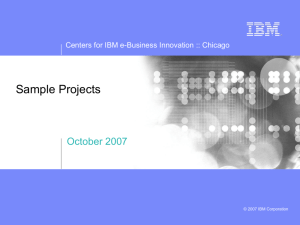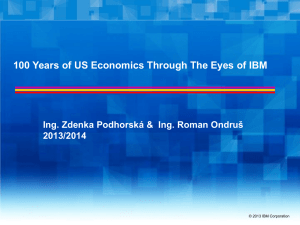- ECR Community
advertisement
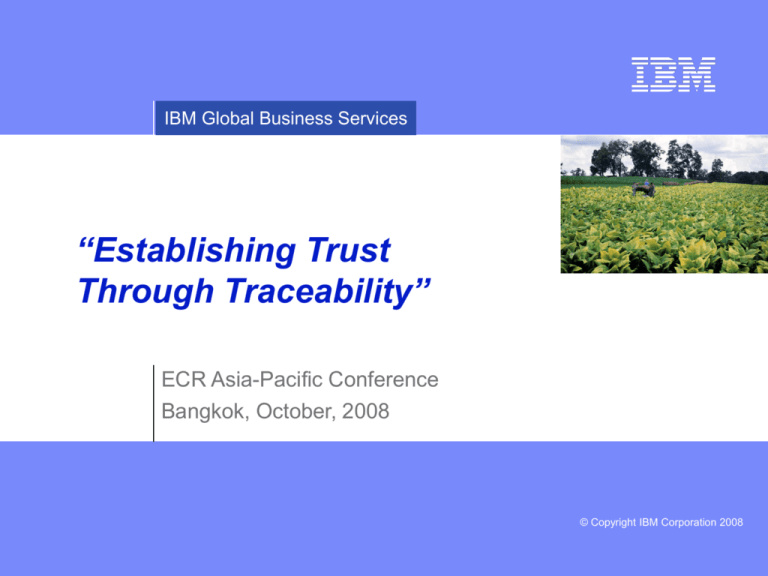
IBM Global Business Services “Establishing Trust Through Traceability” ECR Asia-Pacific Conference Bangkok, October, 2008 © Copyright IBM Corporation 2008 IBM Global Business Services Contaminations and recalls are changing consumer perceptions and purchasing behaviors, and eroding consumer trust ► 42% of consumers buy different brands today versus 2 years ago … because they are looking for safer products ► 47% are more concerned today about food safety than they were 2 years ago Rice GMO Lettuce Chocolate E. Coli Salmonella Chocolate Spinach Chocolate Onions Salmonella E. Coli Nuts E. Coli Mushrooms E. Coli Chicken Snack food Dog treats Listeria Salmonella Melamine Chicken CantaloupeGr. Beef Bird Flu Salmonella Coli Tomatoes►Jalapeños Salmonella E. Toothpaste Cantaloupe Toys Formula Diethylene Glycol Salmonella Lead Melamine Peanut Butter Baby Food Pet Food Canned Chili Gr. Beef Coli Salmonella Botulism Melamine? Botulism 2006 2007 E. Beef Pork E. Coli LIsteria 2008 Source: IBM research, IBM survey of U.S. and UK consumers; Fortune, July 16, 2008 2 Establishing Trust Through Traceability | June 15th, 2007 © Copyright IBM Corporation 2008 IBM Global Business Services Consumer confusion around the efficacy of new product health and wellness claims have also eroded consumer trust ► 73% are skeptical at some level that branded food products deliver the health and wellness benefits advertised Calorie burning energy drink Cereal with probiotics and fiber for digestion Antioxidant fortified cereal 2006 survey of consumer skepticism 82% ‘agreed’ that “claims made by food and drink products often exaggerated or unproven” 52% felt that ‘health boosting claims by food and drinks players were untrustworthy’ Yogurt with probiotics for digestive health Spread with Omega-3 oils for heart health Omega-3 fortified peanut butter 2007 survey of health and wellness Heart healthy chocolate Protein, fiber and Omega-3 fortified pasta Melatonin rich milk to aid sleep Consumers confused by conflicting science “The health and wellness market needs to focus on avoiding consumer confusion as a result of an abundance of scientific information…” Source: “Coke Says Things Go Better with Green Tea:”, Financial Review, 10/23/06; www.cocoavia.com; www.smartbalance.com; www.kashi.com Source: “How To Exploit New Wellness Trends in Food”, Datamonitor, 09/06; “Consumer Skepticism of Healthy Food Claims – Another Report”, Nutraingredientsusa.com, 12/6/05; “Confusing Claims Harm Consumer Trust”, Food & Drink – Europe, 07/16/04; “2005 Consumer Attitudes Toward Functional Foods/ Foods For Health”, International Food Information Council, 07/06 3 Establishing Trust Through Traceability | June 15th, 2007 © Copyright IBM Corporation 2008 IBM Global Business Services … however a proliferation of corporate responsibility claims is only adding to the confusion and fostering distrust "Ethical" coffee is being produced in Peru, the world's top exporter of Fairtrade coffee, by labourers paid less than the legal minimum wage. Carbon Footprint Carbon Crisps Neutral Beer Socially Responsible H20 WWF alleges tens of thousands of hectares of rainforest in Indonesian National Parks cleared to grow coffee ► 40% of consumers are negative or ambivalent about media attention regarding our impact on environment ► Only 13% of consumers believe companies adopt environmentally friendly practices because they care about the environment Advocacy group claims retailer is misleading its customers by labeling non-organic foods as ‘organic’ Source: Brandweek, July 15, 2008; Financial Times, September 9 2006; Financial Times, January 17, 2007; www.CNNMoney.com 4 Establishing Trust Through Traceability | June 15th, 2007 © Copyright IBM Corporation 2008 IBM Global Business Services Traceability systems can serve as that source of trusted information allowing CP companies to connect with concerned consumers, and realize other benefits Brand Empowerment Supply Chain Efficiency Risk Mitigation Compliance Become trusted source of information to the ‘Omni Consumer’. Empower brands to make new claims. Accelerate product flows and reduce inventory levels through increased visibility to inventory and movements Protection of brand through identification of risks and isolation of contaminated product Ensure compliance with both individual retailer mandates and government regulations Trusted information Fertilizers Antibiotics Ingredients Logistics Logistics Logistics Corn Farmer Logistics Cattle Rancher Packaging Logistics Beef Processor Logistics Ingredients CP Manufacturer Logistics Trace The ability for each member of a supply chain to trace the ownership and characteristics of ingredients, packaging and products backwards Logistics Track and trace products and risks within own four walls to isolate and prevent issues Distribution Center Grocery Retailer Logistics Track The ability for each member of a supply chain to track the movement of ingredients, packaging, and products forward through the supply chain Source: Economic Research Service, United States Department of Agriculture 5 Establishing Trust Through Traceability | June 15th, 2007 © Copyright IBM Corporation 2008 IBM Global Business Services Typically associated with food safety, most traceability systems today fall short of either protecting brands from recalls, or empowering them to make new claims Current Gaps / Shortfalls Traceability systems capture, store, access, aggregate and communicate product, supplier, customer, handling and processing information to: - Credibly support new marketing claims, and - Prevent, identify and isolate product contamination issues 6 Establishing Trust Through Traceability | June 15th, 2007 Data: Limited breadth and depth of information captured Critical information not available across organization Information not readily available to 3rd parties Data elements not standardized to facilitate sharing and comparison Relevant data stored in disparate systems Data collected not aligned internally (i.e., MES data does not align with ERP) Organization / Culture: Compliance driven mindset - only invest where necessary Limited ability to track / trace outside own four walls Downstream tracking capability usually stronger than upstream Process: Processes not standardized Process steps not effectively monitored Manual processes dominate data collection © Copyright IBM Corporation 2008 IBM Global Business Services To realize the Full Value Traceability opportunity CP companies need to move forward on four imperatives, starting by aligning their Traceability capabilities with the requirements of the brand 1 Leverage Traceability to Protect and Empower the Brand 2 Define Traceability vision, and create an roadmap 3 4 7 Develop deep understanding of target ‘Omni Consumers’ Establish fact-based understanding of product/brand attribute risk elements Prioritize traceability requirements within existing product portfolio Define traceability requirements within new product development pipeline Ensure traceability investments deliver capabilities that support the brand Recognize that Traceability is complex, strategic undertaking Adopt an evolutionary path for of process, capability and tool development Establish clear executive level and functional responsibility and sponsorship Prioritize desired/required functionality leveraging assessment of current IT and Supply Chain capabilities, and product/brand risks and opportunities Integrate the physical and informational supply chain Leverage distributed, standards based architecture for data management CP companies need to effectively and efficiently move product, and capture, manage and communicate data about product(s) and their movements Establish one version of the truth for customer, product and supplier data Automate collection, analysis, and communication of data Proactively engage with Traceability stakeholders Embrace whole supply chain perspective Identify stakeholders, define their Traceability related stake and develop engagement plans that drive alignment with company vision Create a shared Traceability vision and development roadmap with vendors and suppliers Establishing Trust Through Traceability | June 15th, 2007 © Copyright IBM Corporation 2008 IBM Global Business Services Full Value Traceability systems capture, a) product movements, b) attribute changes, and c) processing activities across and within the supply chain Each company maintains its own product information and record of transactions, making that information available on a permission basis to stakeholders Fertilizers Antibiotics Ingredients Logistics Logistics Logistics Corn Farmer Cattle Rancher Logistics Data Data Transaction & Historical Data Firewall Track and trace products and risks within the four walls to isolate and prevent issues CP Manufacturer Logistics Data Data Firewall Firewall Virtual Traceability System Establishing Trust Through Traceability | June 15th, 2007 Distribution Center Logistics Firewall Rapid communication of essential data facilitated through open-standard software and adoption of industry ID standards 8 Ingredients Logistics Beef Processor Firewall Logistics Packaging Grocery Retailer Logistics Data Data Firewall Firewall Data security maintained via encryption, restricted password access, etc… © Copyright IBM Corporation 2008 IBM Global Business Services Creation of a virtual Traceability ‘ecosystem’ will accelerate realization of the Full Value Traceability opportunity Each stakeholder of the Virtual Traceability ‘Ecosystem’ plays a role empowering and protecting the brand Virtual Traceability ‘Ecosystem’ Direct Supply Chain Corn Farmer Cattle Rancher Beef Processor CP Manufacturer Distribution Center Auditors Grocery Retailer Insurers Creditors Non-Profits and NGOs Regulatory Agencies IT Service Providers Logistics Service Providers (LSP) Advertising Agency Packaging Suppliers Media Co-Packers Food Brokers Government Trade Associations Equity Analysts Local Communities Consumers Protect & Empower Brand Shoppers Influencers Common Data Standards Distributed IT Infrastructure Ecosystem Enablers Executive Sponsorship & Support Stakeholders with critical role protecting or empowering the brand 9 Establishing Trust Through Traceability | June 15th, 2007 © Copyright IBM Corporation 2008 IBM Global Business Services IBM is working with partners such as FXA to create a complete traceability solution FXA IBM Scope of Work Request Traceability Data Customer Send Traceability Data EPCIS Websphere RFID Information Center Send production Data and Quality Data Request Traceability Data Send Traceability Data Send Production Data and Master Data ERP / MRP Manual input and/or IBM Food safety manager Websphere Premises Server Send Data from RFID Capture device RFID Data Capture Device 10 Establishing Trust Through Traceability | June 15th, 2007 © Copyright IBM Corporation 2008 IBM Global Business Services Product Overview Electronic Data Exchange Secure data Storage Web enabled Configurable User Interface Multi Domain Permitted Data Access 11 Establishing Trust Through Traceability | June 15th, 2007 Trace with • Flexible search parameters • Bi-directional • Drill Down • Permitted Access © Copyright IBM Corporation 2008 IBM Global Business Services Build User Interface 12 Establishing Trust Through Traceability | June 15th, 2007 © Copyright IBM Corporation 2008 IBM Global Business Services Trace Icon is OpsSmart’s Data Entry Form 13 Establishing Trust Through Traceability | June 15th, 2007 © Copyright IBM Corporation 2008 IBM Global Business Services 14 Establishing Trust Through Traceability | June 15th, 2007 © Copyright IBM Corporation 2008 IBM Global Business Services 15 Establishing Trust Through Traceability | June 15th, 2007 © Copyright IBM Corporation 2008 IBM Global Business Services 16 Establishing Trust Through Traceability | June 15th, 2007 © Copyright IBM Corporation 2008 IBM Global Business Services 17 Establishing Trust Through Traceability | June 15th, 2007 © Copyright IBM Corporation 2008 IBM Global Business Services 18 Establishing Trust Through Traceability | June 15th, 2007 © Copyright IBM Corporation 2008 IBM Global Business Services FXA References 19 Betagro Biotec – Black Tiger Shrimp Broodstock Cameron farm – Hatchery and Nursery Surajthani Shrimp Farm Cooperative Tacheen Shrimp Farm Cooperative Thathong Shrimp Farm Cooperative Pakfood – 3rd largest manufacture Grampian Foods River Kwai Taniyama CPF Chantaburi Frozen Food – Part of Rubicon group Department of Fisheries Department of Livestock Development Department of Agriculture National Bureau of Agricultural Commodity and Food Standards Establishing Trust Through Traceability | June 15th, 2007 © Copyright IBM Corporation 2008 IBM Global Business Services Change management 20 Management of processes in compliance with best practices Commitment to Quality and safety processes Transparency Willing to adopt new technology Management Commitment Tightly integration with suppliers and authorities Utilization of the information to productivity and efficiency Establishing Trust Through Traceability | June 15th, 2007 © Copyright IBM Corporation 2008 IBM Global Business Services EPCIS: Enabling exchange of traceability information through global standards System defined by GS1 for exchanging information on serialized items Developed for RDIF technology, can be used to exchange associated information Does not require RFID tagging. Can store the serial number in a SGTIN on a bar code Serialization can be at the item, case, pallet or container level IBM’s RFID Information Center supports all the EPCIS standard protocols Supported by leading companies such as Carrefour, Henkel, Kraft International, Metro Group, Nestlé, Procter & Gamble, Rewe Group 21 Establishing Trust Through Traceability | June 15th, 2007 © Copyright IBM Corporation 2008 IBM Global Business Services Where to go for help Visit the IBM stand in the exhibition area Download the GS1 guides from - http://www.gs1.org/productssolutions/traceability/ Download the “European EPC Guide for Retailers and Manufacturers” - http://www.gs1.eu/index.php?page=&tudasbazis=60&lister=47 E-mail - 22 chris.cave.jones@sg.ibm.com chattau@fxagroup.com Establishing Trust Through Traceability | June 15th, 2007 © Copyright IBM Corporation 2008
